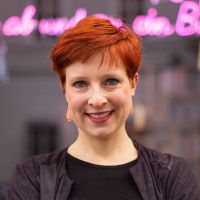Martina Fladerer, M.A. BA
Gestures of Musicking. Sound(ing) Surprises! – Participatory Music Spaces by Adults for Adults
Erstbetreuerin: Univ.-Prof.in Mag.a Dr.in phil. Constanze Wimmer, Kunstuniversität Graz, Institut für Komposition, Musiktheorie, Musikgeschichte und Dirigieren
Zweitbetreuer: A.Univ.-Prof. Mag. Dr. Martin Weichbold, Paris-Lodron-Universität Salzburg, Fachbereich Politikwissenschaft und Soziologie
Abstract
Although listening to music is a very common practice among adults, and therefore music plays a significant role in adults’ lifestyles, only few are actively engaged in being creative or making music themselves. That might also be related to the view on non-professionals as mainly recipients in the field of music. While these days people can choose between a wide range of experimental and novel listening settings, participatory approaches for adults are still rather uncommon in German speaking countries and can be found mostly in the area of digital music spaces or the upcoming field of Community Music.
In order to design participatory music spaces for adults, the demanding challenge lies in considering the diversity of the target group as well as the specifics of adulthood. Therefore, it does not seem eligible to just refer back to pedagogy as a framework but rather to include a heutagogy approach which offers relevant aspects for self-determined music settings. Granting autonomy to potential participants, from designing to implementing and evaluating participatory music spaces, is essential as adults demand for self-determination in musical contexts, too.
Never losing sight of the main questions, the process is built on the idea of crowdsourcing: What are adults’ crucial needs, expectations and hopes? How can you achieve to create participatory music spaces for adults – referring to sociological and performative space theories –, which arouse the interest of adults and encourage their active involvement?
The primary assumption is that adults seize the occasion of creating music if neither underlying subconscious restraints like doubting one’s own ‘musicality’ nor barriers of time, place and location hinder them – taking into account the premise that mankind, homo ludens, is characterized by its ludic drive to explore unfamiliar terrain. Another hypothesis is that music through its versatile nature is perfectly capable to integrate the experimental and playful trying-out in itself. Thereby the conception of music, its mode and its appearance are continuously reshaped and becoming flexible – which is essential when thinking of innovative ways in the field of participatory music making. By implementing methods like Action Research and Design Based Research or World Café or Guerrilla Research Tactics the aim of this research is to create new approaches of participatory music spaces. Furthermore, these concepts should be evaluated in relation to their sustainability, acceptance and grade of participation.
Short biography
Martina Fladerer is PhD student at the doctoral program “Arts and their social impact – Dynamics of change” (Paris-Lodron-University of Salzburg/Mozarteum University Salzburg). She graduated from the interdisciplinary Bachelor “German Studies and Economics” (University of Mannheim) before accomplishing her studies in instrumental pedagogy with clarinet as main subject (Nuremberg University of Music and Mozarteum University Salzburg).






